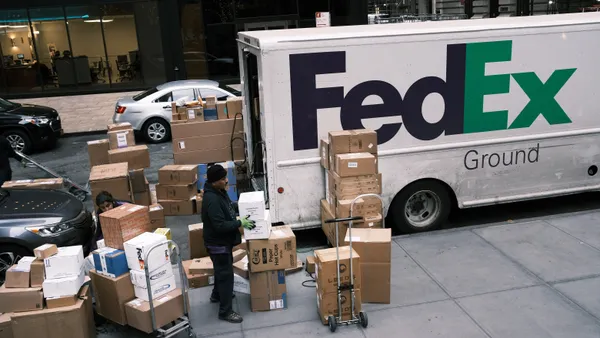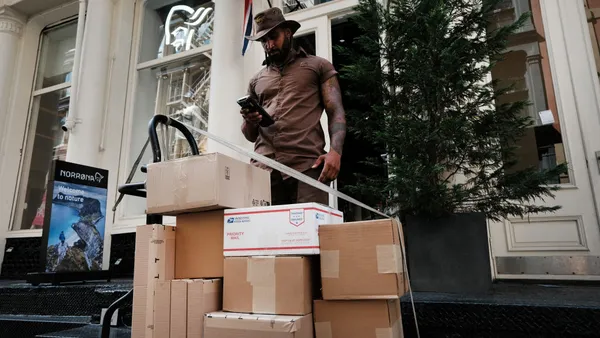Pitney Bowes' e-commerce logistics unit is shutting down, with many of its parcel delivery and returns services ceasing operations in the coming weeks, the company announced Thursday.
Pitney Bowes sold the majority interest of its Global Ecommerce unit to financial services firm Hilco Global, which will liquidate and wind down the business. The process, which will occur through Chapter 11 bankruptcy, is expected to conclude early next year.
In a news release, Pitney Bowes said the move was in the best interest of the company and will help drive improved results in 2025. The company faced investor pressure for several quarters to sell the unit amid continued losses.
Global Ecommerce, or GEC, revenue grew 7% year over year in Q2, driven by higher domestic parcel volumes. However, it posted a $31 million loss in adjusted earnings before interest and taxes.
"Notably, the GEC segment had been struggling to achieve profitability over the past several years in the face of macroeconomic and industry headwinds," according to Pitney Bowes.
The unit provides domestic and cross-border parcel shipping services, partnering with carriers like the U.S. Postal Service for last-mile delivery. It previously offered fulfillment services before selling that part of the business to fulfillment startup Stord in July. Its customers have included Shein, Victoria's Secret, Hudson's Bay and BarkBox owner Bark.
“GEC has been a popular and well-established service within the global and domestic parcel delivery industry, so undoubtedly it will have some reverberating affects on the market,” Nicholas Fanelli, managing director of Shippingwise, said in a LinkedIn post. “But in a down market, it might not be as noticeable as it would be otherwise.”
Many parcel delivery providers have struggled to adjust since the demand surge of the COVID-19 pandemic cooled. Startups Maergo and Point Pickup shut down this year, while delivery giants like UPS and FedEx are offering up shipping discounts to regain volume from shippers.
UPS estimated earlier this year that the U.S. small package market had a carrier capacity surplus worth 12 million in average daily volume, giving carriers little room for error.
"What I will tell you is this market is very hard right now with the overcapacity that's out there," Jason Dies, Pitney Bowes' previous interim CEO, said on a May earnings call.
Pitney Bowes outlined what shippers using its GEC services can expect on a website about the wind-down.
Global Ecommerce facilities will accept customers' Domestic Forward Standard Delivery and Domestic Cross-Border U.S. Outbound packages until 12 p.m. local time on Aug. 17. After that, Pitney Bowes will turn away those packages.
The company also won't accept any returns packages in its pickup and dropoff network after Aug. 9. However, it will continue to pick up returns from the U.S. Postal Service network until Sept. 5.
"A top priority of Pitney Bowes is to minimize disruption and to maintain the highest level of service during GEC's transition," said Lance Rosenzweig, interim CEO, in an earnings call Thursday. "We have reached out to other providers, and will assist clients to the fullest extent possible in transitioning to the best alternatives in the market."
Pitney Bowes' SendTech and Presort segments will continue to operate as normal.















